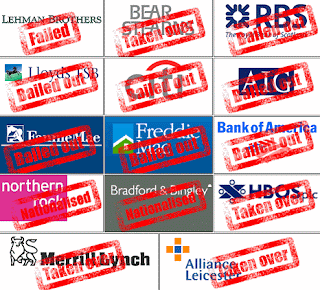BANKING AND THE COMMON GOOD
As we all know we (the people) own much of Northern Rock, RBS and Lloyds and have had to support with financial investments in market structures, liquidity and insurance virtually all other financial services companies. Now I can tell you, and it should come as no surprise, that all the banks that have received state support are desperate to get the government, i.e. our representatives, out of their affairs. This is the major focus of RBS and Lloyds and what will allow this to happen is moving back into profit fast, stablising balance sheets and stopping all unprofitable activity. This agenda is consuming their management teams. These activities are being supported by governments that, quite rightly, don't want to run or be involved with commercial enterprises and want to show a return for the investment of our money as soon as possible.
- make a profit, but not seek to drive super-profit
- seek to grow their value, and that of their shares, by long term investments in businesses and people, not short term quarter by quarter spinning and lurching
- stay away from the complex, synthetic, products which make a lot of money but are often so far removed from any underlying creation of a value to society
- realise that they are a part of the fabric of our nations, not just a commercial entity, and that with this comes responsibility to serve and work with a wide range of consumers
- don't hide behind or pander to the "consumer" - for example if someone doesn't understand credit don't give it to them
- seek to get seriously involved in supporting community cohesion and the broader issues in society - millions are financially excluded, maybe there isn't much money to be made, but working with these consumers responsibly would provide a social good
- back businesses and become a facilitator of solutions to keep businesses going rather than too often making arbitrary decisions, of the "computer says no" type that mean good but cashflow challenged businesses goes under
- see the opportunity for their people and places to become centres of the community - why wouldn't the local bank manager go to local schools and talk about money and how it should be managed or invite local people into the bank to discuss community funding of projects. (Interesting to see what the Campaign for Community Banking is lobbying for - shared branches for example, recently rejected by HSBC)
- create an environment where staff could really be proud of what they do, and one where debate and challenge, not to the specific issue or product, but on a broader more fundamental level is encouraged and actioned
And in return we would need to cut the banks a break. We will need to understand that the fixing of the system is hard, it will have ups and downs, successes and failures. There will continue to be excesses as the old status quo evolves to something different. The market will need to allow management teams to deliver lower absolute profitability, without the ruthless short term focus; and develop new measures for contribution of the business both financial and societal. The media will need to focus less on the reaction to short term issues and seek to represent and support the longer term goals of delivering a "common good" through intelligent and informed debate.
And there are some potential new practises emerging:
Barclaycard is launching a new online account management system which allows spend analysis by category in order to give their customers better information.
Tesco Personal Finance are talking (but only talking at the moment) about building a bank rewarding loyalty.
There is talk of a "Post Bank" being launched using the infrastructure of the Northern Rock (see this article). And other local community banks are also being discussed.
I am sure many, even some old colleagues, will read this and think it is all pie in the sky thinking. But if we allow the system to return to the old status quo, albeit with some structural or regulatory modifications, then I think we will have squandered an opportunity of a lifetime to forge something new and better for the banks, the bankers, our society and for us as consumers.
What do you think? Please leave a comment, thought, disagreement or agreement below or drop me an email at: justin@basini.com
As always please feel free to share, Retweet, Digg or bookmark! I really appreciate it.
Thanks for reading (and thinking),
Justin
Did you know you can sign up for updates and news from Justin Basini? Just click here.

